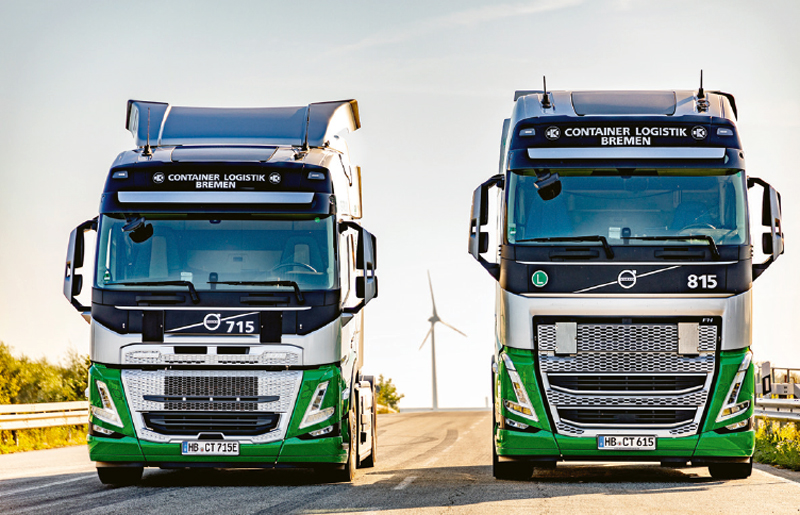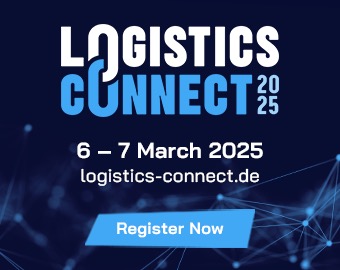EKB Container Logistik is a company often referred to in the industry as the “Greens”. This is not only because the company logo is green but also due to the climate and environmental protection concept they implement in their day-to-day business.
EKB was already a pioneer in 1966, the year it was founded. When the “MS Fairyland” brought the first containers to Germany and moored in Bremen, the company, as a member of the Kieserling Group back then, handled the boxes at the quay and transported them by truck to their final destination. Today, EKB has around 300 of its own trucks, a good third of which are fuelled with bio-LNG, as are approximately 500 vehicles belonging to subcontractors. Together, 1,000 chassis transport around 450,000 containers per year, covering a distance of 90,000 kilometres on the Hamburg-Antwerp range and the associated hinterland. “A few weeks ago, we signed a purchase agreement for bio-LNG that will last several years,” Heemeyer adds, referring to the company’s own fleet of trucks and acknowledging the alternative fuel’s growing significance. “We want to source this fuel exclusively in future, which is a privilege, as it’s only sufficient to supply 15 per cent of freight traffic.”
A broad energy mix instead of a single solution
For Heemeyer, the advantages of bio-LNG are quite clear. After all, over 90 per cent of truck emissions can be saved by using liquefied biogas, yet he only considers it a temporary solution. “Bio-LNG isn’t a solution for the next 50 years but it is one that is practicable right now, especially on long journeys,” he continues, adding that this is why he and his colleagues are keeping a very close eye on the development of sustainable options in the energy market. “I don’t believe there’ll be a one-size-fits-all energy source,” he says. “Rather, I think we should get ready for a wide-ranging energy mix in which hydrogen, battery-electric drives, bio-LNG and HVO100 diesel can play an important role.” Planning many years ahead is, therefore, not possible currently. “But I can work with every new technology at the very least,” he adds with a wink.
With the aim of broadly positioning itself as a climate-focused company, EKB also integrated the first electric truck into its fleet in late July. It has only been used for short journeys and in factory operations so far, but experiences with it have been good. “Depending on how heavily it’s charged, one e-truck battery is sufficient for an average journey of between 300 and 350 kilometres,” Heemeyer explains. “This means that, for example, the route from Flensburg to Rosenheim would require two four-hour charges, which simply doesn’t make economic sense.” Besides the distance problem, there is also the lack of fast-charging points. He also believes that the battery swap solutions on the market, until now offered by Chinese suppliers, are not a solution that could be effective in the near future. “On the one hand, we need to find a standardised solution,” he indicates. “I can’t see one at the moment, given the large number of different e-mobility providers. On the other hand, battery removal and installation is much more difficult for trucks than it is for cars.”

First infrastructure, then trucks
However, EKB will continue to stay in the loop where the climate and environmental protection are concerned and their strategy has proven effective so far. “We always invest in infrastructure first, and only then do we buy the necessary vehicles,” Heemeyer explains – but not without first criticising how the German government has implemented its additional charge subsidy. “80 per cent of the additional costs to a diesel are covered by the Federal Logistics and Mobility Office. As this is coming from 2024’s budget funds, though, we won’t receive the money until next year, despite the decision. With several trucks, this can add up to quite a considerable sum.” Where money is concerned, he adds that the industry is and will remain price-driven. “While shipping agents, freight forwarders and shipping companies largely favour cheap transport solutions over environmentally friendly ones, establishing sustainable solutions on the market in an economically viable way will remain a real challenge for us.” (bre)

“Bio-LNG isn’t a solution for the next 50 years.”
Ole Heemeyer, Commercial Director
at EKB Container Logistik
Facts
EKB Container Logistik
Founded: 1966
Employees: 500
Locations: 10, headquarters in Bremen
Trucks: 800
Chassis: 1,100
Containers: 450,000






